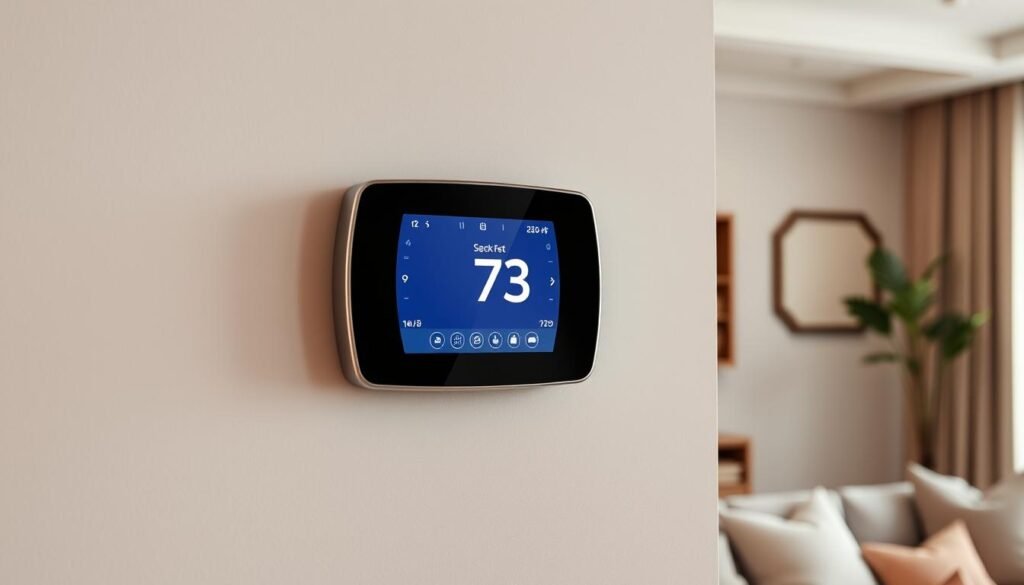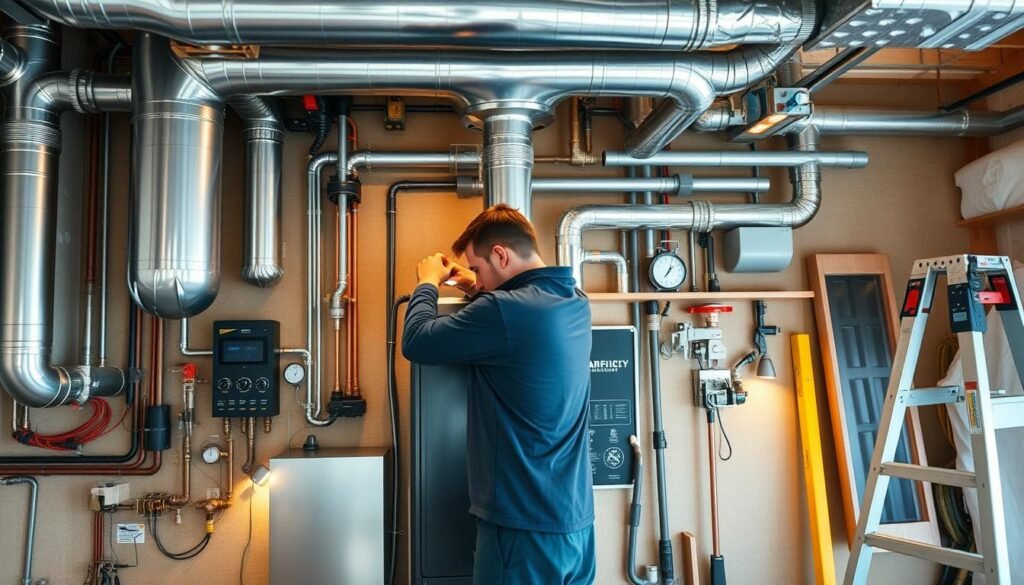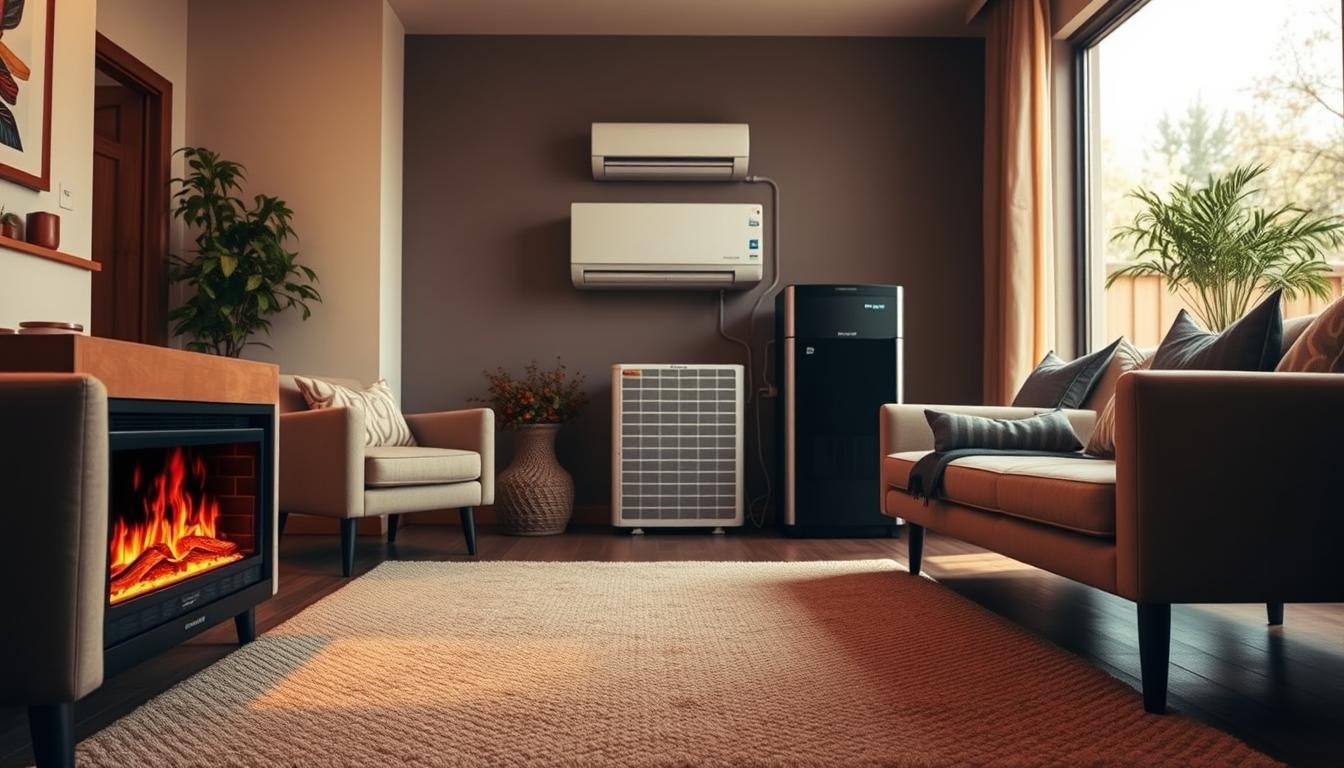Canada’s winters are harsh, making efficient heating essential. Over 60% of Canadian households use natural gas for warmth. Choosing the right heater is key for comfort and saving energy.
Finding the perfect heater in Canada can be tough. The climate varies, and there are many options. These include electric heaters, wood stoves, and heat pumps.
I will look at the top-rated heating solutions for Canadian homes. We’ll focus on their efficiency, reliability, and how well they work in Canadian climates.
Key Takeaways
- Top-rated heating solutions for Canadian climates
- Energy-efficient home heaters to save on utility bills
- Reliable heaters for consistent warmth
- Comparison of electric, natural gas, and wood stove heaters
- Suitable heating options for different Canadian regions
Understanding Canada’s Unique Heating Challenges
To heat a Canadian home well, you need to think about the climate and insulation. Canada’s big size means different climates in each area. So, picking the right heating system is key.
Regional Climate Variations Across Canada
Canada’s weather changes a lot from one place to another. Some areas have very cold winters, while others are milder. Knowing these differences helps pick the best heating system.
The country has several climate zones, each needing its own heating. For example, the Atlantic region gets a lot of rain, while the prairies are very cold in winter and hot in summer.
| Region | Climate Characteristics | Heating Requirements |
|---|---|---|
| Atlantic Canada | Maritime climate, high precipitation | High insulation needs, resistant to moisture |
| Prairies | Cold winters, hot summers | Efficient heating for cold winters |
| British Columbia | Milder winters, varied precipitation | Flexible heating solutions, energy-efficient |
Insulation Considerations for Canadian Homes
Good insulation is vital in Canadian homes to keep warm in winter. It saves on heating costs and makes homes more comfortable.
Homeowners should look at insulation R-values, window condition, and seal gaps and cracks. This ensures homes are well-insulated.
Types of Heating Systems for Canadian Homes
Canada’s varied climate means different heating options are needed. Homeowners can choose from forced-air systems to radiant heating. These choices ensure comfort and efficiency during winter.
Forced-Air Heating Systems
Forced-air systems are popular in Canadian homes. They heat air that flows through ducts and vents, warming spaces quickly. They’re great because they heat fast and work with air conditioning, making them good for all seasons.
These systems can run on natural gas, propane, or electricity. The choice depends on what’s available, cost, and personal preference. Keeping them well-maintained is key to their efficiency.
Radiant Heating Options
Radiant heating uses elements like pipes or mats under floors or in walls. It heats objects and people directly, not just the air. This method is both energy-efficient and comfortable.
There are different radiant heating systems, like hydronic and electric. The right choice depends on the home’s design, insulation, and heating needs.
Space Heaters and Portable Solutions
Space heaters and portable solutions are great for extra warmth or in places without central heating. They come in electric, propane, and oil-filled types, each with its own benefits and safety points.
When picking a space heater, look at safety features, energy use, and the area’s size. Portable heaters are a smart choice for specific areas or during power outages.
| Heating System Type | Key Benefits | Energy Sources |
|---|---|---|
| Forced-Air | Rapid heating, versatile | Natural Gas, Propane, Electricity |
| Radiant Heating | Energy efficient, comfortable | Electricity, Hydronic (Hot Water) |
| Space Heaters | Flexible, targeted heating | Electricity, Propane, Oil |
Best Heaters for Canadian Homes: Electric Options
Canadian homeowners often choose electric heaters for their efficiency and reliability in winter. These heaters are a cost-effective way to keep homes warm and cozy.
There are many electric heaters on the market, but some stand out. We’ll look at top picks like oil-filled radiators, portable space heaters, and wall-mounted units.
DeLonghi Oil-Filled Radiators
DeLonghi oil-filled radiators are known for their consistent and efficient heat. They use oil to store heat, making them quiet and gentle. They’re perfect for Canadian homes where it gets very cold in winter.
Key Features: These radiators have multiple heat settings and adjustable thermostats. They also have anti-freeze settings and safety features like overheat protection and tip-over switches.
Dr Infrared Heater Portable Space Heaters
The Dr Infrared Heater is a favorite for its portability and efficiency. It uses infrared technology to warm up quickly, making it great for Canadian homes in colder areas.
Key Features: It has adjustable heat settings and a remote control for convenience. It’s also compact and has safety features like overheat protection and a tip-over switch.
Lasko Ceramic Tower Heaters
Lasko Ceramic Tower Heaters are known for their sleek design and efficient heating. They use ceramic elements to warm up fast and have features like multiple heat settings and oscillation for even heat.
Key Features: They’re designed for convenience with digital controls, timers, and a compact tower design. They fit well in most home settings.
Dimplex Wall-Mounted Electric Heaters
Dimplex wall-mounted electric heaters are a space-saving and stylish option. They’re perfect for homes with limited floor space.
Key Features: They have programmable thermostats, multiple heat settings, and a sleek design. They also come with safety features like overheat protection.
Top Natural Gas Heating Solutions
Natural gas heating is a reliable choice for homes in Canada. It offers efficiency and cost savings. For those with access to natural gas, it’s a cost-effective heating option.
Lennox and Carrier High-Efficiency Gas Furnaces
Lennox and Carrier are top brands in heating. They offer high-efficiency gas furnaces for various home sizes and insulation. Their furnaces provide optimal heating and use less energy.
Lennox furnaces are known for their reliability and advanced tech. They have modulating heating that adjusts to your home’s needs. Carrier furnaces have high AFUE ratings, leading to reduced energy bills.
Napoleon and Valor Gas Fireplaces
Napoleon and Valor gas fireplaces add a cozy ambiance to homes. They provide efficient heating and are a stylish focal point in any room.
Napoleon fireplaces are known for their sleek designs and advanced combustion tech. They burn clean and efficiently. Valor fireplaces offer realistic flame effects, improving your home’s ambiance and providing supplementary heating.
Rinnai Direct-Vent Gas Space Heaters
Rinnai direct-vent gas space heaters are efficient and safe. They’re great for homes needing zone heating. This lets you heat specific areas without wasting energy.
Rinnai heaters are high in efficiency and use direct-vent technology. This draws air from outside and expels it outside, improving air quality. They come in various models to meet different heating needs, making them versatile for Canadian homeowners.
Best Propane Heaters for Areas Without Natural Gas
Propane heaters are a great choice for places without natural gas. They keep homes warm and cozy during Canada’s cold winters. They are a reliable and efficient way to heat homes without natural gas.
Carrier and Rheem Propane Furnaces
Carrier and Rheem make top-notch propane furnaces. These furnaces heat homes well, even without natural gas. Carrier propane furnaces use the latest tech for better energy use. Rheem propane furnaces are built to last and work great.
- High-efficiency models available
- Durable construction for long-lasting performance
- Advanced technology for optimal heating
Mr. Heater Portable Propane Heaters
Mr. Heater portable propane heaters are great for flexibility. They’re perfect for extra heat or when you can’t install a permanent heater. They’re easy to carry, simple to use, and safe.
- Portable and easy to move
- Safety features for secure operation
- Effective for supplemental heating
Napoleon and Kingsman Propane Fireplace Options
Napoleon and Kingsman have many propane fireplace options. They heat and add beauty to any room. These fireplaces are efficient and safe, with features like remote control and adjustable heat.
- Aesthetic appeal with realistic flame effects
- Efficient heating with multiple settings
- Remote control for convenience
In summary, propane heaters are a good choice for Canadian homes without natural gas. You can choose from furnaces, portable heaters, or fireplaces. There’s something for everyone’s needs and tastes.
Wood and Pellet Stoves for Canadian Winters
In Canada’s cold winters, wood and pellet stoves are a renewable and sustainable heating option. They are efficient and cost-effective, unlike traditional heating methods.
Pacific Energy and Regency Wood Stoves
Pacific Energy and Regency are top brands in wood stoves. Pacific Energy stoves are known for their efficiency and environmental friendliness. The Pacific Energy Super 27 is a favorite among Canadian homeowners.
Regency stoves mix traditional design with modern tech. They ensure a warm and cozy home.
“The craftsmanship and attention to detail in Pacific Energy stoves are unmatched,” says a satisfied customer. This highlights the brand’s commitment to quality.
Harman and Enviro Pellet Stoves
Harman and Enviro lead in pellet stoves, with models for various heating needs. Harman stoves are known for advanced technology and high efficiency. They are a top choice for reliable heating.
Enviro stoves are sleek and easy to use. They offer both function and beauty.
- High efficiency ratings
- Environmentally friendly
- User-friendly operation
Installation Requirements and Considerations
Installing a wood or pellet stove needs careful thought. You must consider ventilation, chimney requirements, and local building codes. Always consult a professional for safe and proper installation.
As a heating expert notes, “Proper installation is key to the safe and efficient operation of wood and pellet stoves.”
| Brand | Model | Efficiency Rating |
|---|---|---|
| Pacific Energy | Super 27 | High |
| Regency | F2400 | High |
Heat Pumps: An Efficient Option for Milder Canadian Regions
Canada’s climate changes a lot from place to place. Heat pumps are a great heating choice for milder areas. They move heat from one place to another, not making it from fuel. This makes them good for places with not-so-cold winters.
“Heat pumps are a game-changer for heating in mild climates,” says an industry expert. They can heat and cool, making them useful for Canadian homes.
Mitsubishi and Fujitsu Air-Source Heat Pumps
Air-source heat pumps are popular in Canada. Brands like Mitsubishi and Fujitsu make high-quality ones. These systems take heat from outside air and warm your home.
Key benefits of air-source heat pumps include:
- High efficiency ratings
- Ability to provide both heating and cooling
- Environmentally friendly
WaterFurnace and ClimateMaster Geothermal Systems
For those ready for a bigger investment, geothermal heat pumps are very efficient. Companies like WaterFurnace and ClimateMaster offer reliable systems. They use the earth’s heat for consistent warmth.
Geothermal systems have several advantages, including:
- High efficiency and reliability
- Long system lifespan
- Potential for significant energy savings
Cold-Climate Heat Pump Technology
New cold-climate heat pump tech works better in colder areas. These systems stay efficient even when it’s very cold.
The development of cold-climate heat pumps has expanded the viability of heat pump technology across more of Canada, making it a viable option for a wider range of homeowners.
As tech gets better, we’ll see even more efficient heat pumps. This will make them even more appealing for Canadian homes.
Energy Efficiency Ratings and What They Mean
Energy efficiency ratings are key in figuring out how well your heating system works and its impact on the environment. If you live in Canada, knowing about these ratings is important. It helps you choose a heating system that’s good for your wallet and the planet.
ENERGY STAR Certification for Canadian Markets
In Canada, the ENERGY STAR label is a top sign of energy efficiency. It’s given to heaters that meet high energy standards set by Natural Resources Canada. These heaters use less energy than usual but keep their performance high.
Heaters with the ENERGY STAR label cut down on energy use. They also lower your bills and reduce carbon emissions. When you’re looking for a new heater, check for the ENERGY STAR label. It means the heater is energy-smart. Plus, some places offer rebates for these heaters, making them more affordable.
AFUE, HSPF, and Other Important Ratings
There are other ratings to think about when looking at heating system efficiency. The Annual Fuel Utilization Efficiency (AFUE) shows how well a furnace uses fuel. A higher AFUE means a more efficient furnace.
For heat pumps, the Heating Seasonal Performance Factor (HSPF) is key. It shows how much heat a pump gives out compared to the electricity it uses. A higher HSPF means a more efficient pump.
Other ratings like SEER for air conditioners and COP for certain heaters are also important. Knowing these ratings helps you compare different models. This way, you can pick the most efficient one for your needs.
Long-Term Cost Savings of Efficient Heaters
Getting an energy-efficient heater might cost more upfront. But, it can save you a lot of money in the long run. These heaters use less energy to heat your home, which means lower bills. Plus, many energy-efficient models come with rebates, making them cheaper to start with.
Thinking about the long-term benefits of energy-efficient heaters is smart. They not only save you money on bills but also last longer. As energy prices go up, the savings from an efficient heater will grow too.
Smart Heating Systems for Modern Canadian Homes
Smart heating systems are changing how Canadians heat their homes. They offer better control and efficiency. These systems use advanced technology to help homeowners manage their heating needs.
Nest, Ecobee, and Honeywell Smart Thermostats
Brands like Nest, Ecobee, and Honeywell are leading in smart heating. Their thermostats learn your preferences and adjust the heat for you. This means you get comfort without wasting energy.
Nest thermostats, for example, adjust the heat based on whether you’re home or not. This can save you money on heating bills. Ecobee and Honeywell offer similar features, with some models having remote sensors to check different parts of your home.

Zone Heating Control Systems
Zone heating control systems are another big step in smart heating. They divide your home into zones. This way, you only heat the areas you need, saving energy.
Zone heating makes your home more comfortable and saves energy. For example, you can warm your living room during the day and your bedroom at night. This optimizes your heating use.
Remote Monitoring and Control Options
Smart heating systems let you control your heating from anywhere. Through apps, you can adjust your thermostat settings remotely. This means your home is warm when you arrive.
Many smart heating systems also work with other smart home devices. This gives you even more control over your home’s environment.
Comparative Analysis of Smart Thermostats
| Brand | Model | Key Features | Price |
|---|---|---|---|
| Nest | Nest Learning Thermostat | Auto-scheduling, remote access | $249 |
| Ecobee | Ecobee SmartThermostat | Remote sensors, smart alerts | $249 |
| Honeywell | Honeywell Home T9 | Smart alerts, remote access | $199 |
By using smart heating systems, Canadian homeowners can enjoy better comfort, efficiency, and savings. These systems, including smart thermostats, zone heating, and remote monitoring, offer many benefits. They can make your home’s heating experience much better.
Heating Solutions for Specific Home Types
Choosing the right heating system is key for comfort and saving energy in Canadian homes. Each home has its own heating needs, depending on its age, build, and type.
Heating Options for Older Canadian Homes
Older homes need special heating care. They might have old insulation, windows, and heating systems. Upgrading to modern, efficient heaters can help.
Some good heating choices for older homes are:
- High-efficiency gas furnaces
- Heat pumps made for older homes
- Radiant floor heating systems
Solutions for New Construction
New homes can start with the latest, efficient heating systems. Builders can pick from many options that are good for the planet and work well.
Popular heating choices for new homes include:
- Geothermal heating systems
- High-efficiency air-source heat pumps
- Smart heating systems with zone control
| Heating Solution | Efficiency | Cost |
|---|---|---|
| Geothermal Heating | High | High Initial Cost |
| Air-Source Heat Pumps | Medium to High | Moderate |
| Smart Heating Systems | High | Moderate to High |
Apartment and Condo Heating Considerations
Apartments and condos face special heating issues. They need systems that are small, quiet, and fit with the building’s setup.
Good heating options for apartments and condos are:
- Space heaters with advanced safety features
- Wall-mounted electric heaters
- Central heating systems with zone control
Knowing the heating needs of different homes helps Canadians pick the best and most efficient heating solutions.
Budget-Friendly Heating Options
Keeping warm in Canada doesn’t have to be expensive. There are many affordable heating solutions that are both efficient and cost-effective. As a homeowner, you might want to find ways to lower your heating bills without losing warmth.
Cost-Effective Heaters with Good Performance
Several heaters are great for saving money without losing performance. Here are some top picks:
- DeLonghi Oil-Filled Radiators: They’re efficient and keep the temperature steady.
- Lasko Ceramic Tower Heaters: These are affordable and heat up quickly.
- Mr. Heater Portable Propane Heaters: Perfect for spot heating, they’re cheap and easy to move.
These heaters are not only easy on the wallet but also work well. They’re great for homes in Canada.
Government Rebates and Incentives for Heating Upgrades
Canadian homeowners can also get help from government rebates and incentives. These programs encourage using efficient heating systems.
| Program | Description | Benefit |
|---|---|---|
| ENERGY STAR Rebates | Offers rebates for energy-efficient heating systems. | Up to $500 |
| Canada Greener Homes Grant | Provides financial assistance for home energy improvements. | Up to $5,000 |
| Provincial Rebate Programs | Varies by province, offers rebates for heating upgrades. | Varies |
By using these rebates and choosing affordable heaters, homeowners can cut their heating costs. They also help make their homes more energy-efficient.
Installation Considerations and Requirements
Installing your heating system right is key for safety and efficiency. A correctly installed heater works better and lasts longer. This means you get warmth and comfort all winter long.

Professional vs. DIY Installation
Homeowners often wonder if to hire a pro or do it themselves. DIY might save money, but it can be risky and less efficient. A pro ensures the job is done safely and meets all standards.
Benefits of Professional Installation:
- Ensures safety and compliance with local building codes
- Optimizes the performance and efficiency of the heating system
- Provides warranty coverage, as many manufacturers require professional installation
Permits and Building Codes in Canada
In Canada, heating system installations must follow local building codes. Getting the right permits before starting is a must. It ensures the work is safe and meets quality standards.
Key Considerations:
- Check with local authorities to determine the specific permits required
- Ensure that the installation complies with the National Building Code of Canada and local regulations
Finding Qualified HVAC Professionals
Finding a skilled HVAC technician is essential for a good installation. Look for those certified by the Heating, Refrigeration and Air Conditioning Institute of Canada (HRAI).
Tips for Finding the Right Professional:
- Check for certifications and licenses
- Read reviews and ask for referrals from friends or family
- Verify insurance coverage and warranty offerings
By considering these points, homeowners can have a warm, safe, and efficient heating system all winter.
Maintenance Tips for Optimal Heater Performance
Keeping your heater in good shape is key for warmth in Canadian winters. Regular upkeep makes your heater work better and last longer.
Seasonal Maintenance Checklist
To keep your heater running smoothly, follow this checklist:
- Pre-Season Check: Inspect your heater for damage or wear before heating season.
- Filter Maintenance: Clean or replace filters often for better airflow and efficiency.
- Inspect Vents and Ducts: Look for blockages or leaks in vents and ducts.
- Professional Inspection: Get a pro to check and maintain your heating system yearly.
Troubleshooting Common Heating Issues
Even with regular care, heating problems can happen. Here are some common issues and how to fix them:
- Heater Not Turning On: Check the thermostat and circuit breaker.
- Insufficient Heating: Look for blockages in the filter and vents.
- Unusual Noises: Check for loose screws or debris in the heater.
When to Repair vs. Replace Your Heating System
Choosing between repair or replacement can be tough. Consider these points:
- Age of the System: If your heater is over 15-20 years old, replacing might save money.
- Frequency of Repairs: If repairs happen often, it might be time for a new system.
- Energy Efficiency: New systems use less energy, which can lower your bills.
By following these tips and knowing when to repair or replace, you can keep your home warm and safe all winter.
Environmental Impact of Different Heating Options
Heating our homes uses a lot of energy. The impact on the environment changes a lot depending on the heating system. As Canadians try to cut their carbon footprint, knowing how different heating options affect the environment is key.
Carbon Footprint Comparison
The carbon footprint of heating systems varies a lot. Systems that use fossil fuels like natural gas and propane release a lot of CO2. On the other hand, electric heaters, powered by renewable energy, are cleaner.
| Heating System | Carbon Footprint | Renewable Energy Use |
|---|---|---|
| Natural Gas Heaters | High | Low |
| Electric Heaters (Renewable Energy) | Low | High |
| Propane Heaters | Medium | Low |
| Heat Pumps | Low | High |
Renewable Heating Alternatives
Renewable heating options are becoming more popular in Canada. People are looking for ways to lessen their environmental impact. Solar thermal systems, geothermal heat pumps, and biomass heaters are some of these options.
Solar Thermal Systems use the sun’s energy to warm homes, cutting down on fossil fuel use. Geothermal Heat Pumps use the earth’s heat to efficiently warm homes. Biomass Heaters burn organic materials to produce heat, a carbon-neutral choice when sourced sustainably.
By exploring these renewable heating options, Canadians can make choices that help the environment. This leads to a more sustainable future for home heating.
Conclusion: Choosing the Right Heater for Your Canadian Home
Choosing the right heater for your home in Canada is very important. It affects your comfort, energy bills, and the environment. We’ve looked at many heating options, like electric, natural gas, and wood stoves, as well as heat pumps and smart systems.
When picking a heater, several things matter. Your home’s insulation, size, and layout are key. So is your budget and what you like. For example, a well-insulated home might do well with a DeLonghi oil-filled radiator or a Dr Infrared Heater.
If you’re looking for the best Canadian home heating systems, consider Lennox or Carrier gas furnaces. Or maybe a Mitsubishi air-source heat pump. Don’t forget to check out government rebates for energy-efficient upgrades.
Choosing the right heater is all about keeping your home warm and cozy in Canada’s cold winters. Think about energy efficiency, cost, and how it affects the environment. This way, you can pick the best option and enjoy a comfortable home all year.
FAQ
What are the most efficient heaters for Canadian homes?
High-efficiency furnaces, heat pumps, and radiant heating systems are top choices. They offer reliable and cost-effective heating.
How do I choose the best heater for my Canadian home?
Think about your home’s insulation, climate, and budget. Also, consider your heating needs and the energy efficiency of different systems.
What are the benefits of using a heat pump in Canada?
Heat pumps are energy-efficient and save money. They also provide both heating and cooling, making them versatile and reliable.
Are wood and pellet stoves a good option for Canadian homes?
Wood and pellet stoves offer a renewable heating source and can save on energy costs. But, they need proper installation, maintenance, and ventilation for safe use.
How can I reduce my heating costs in Canada?
Upgrade to an energy-efficient heating system and improve insulation. Use smart thermostats and zone heating control systems. Also, look for government rebates and incentives for heating upgrades.
What are the environmental impacts of different heating options in Canada?
Heat pumps and renewable energy sources have lower carbon footprints. Fossil fuel-based systems, on the other hand, have higher emissions and environmental concerns.
How often should I maintain my heating system?
Regular maintenance is key for optimal performance. Perform seasonal checks, clean or replace filters, and inspect the system for issues.
Can I install a heating system myself, or do I need a professional?
Some systems are DIY-friendly, but hiring a qualified HVAC professional is often recommended. They ensure proper installation and safe operation.
What are the benefits of smart heating systems?
Smart heating systems offer control over heating, energy savings, and remote monitoring. They help optimize heating performance and reduce waste.
Are there government incentives for heating upgrades in Canada?
Yes, there are government rebates and incentives for heating upgrades. They help offset the costs of more energy-efficient systems and home insulation.





